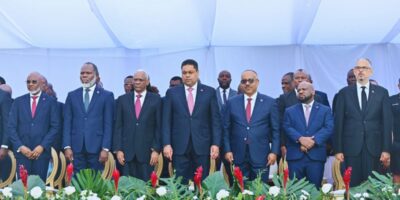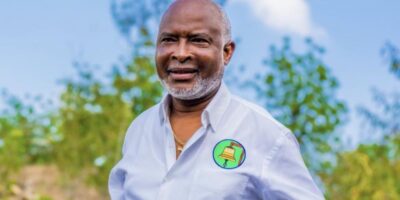Two months after the disembarkation of the 400 foreign agents, frustration and mistrust on both sides threaten the partnership
The Haitian National Police (PNH) and the Kenyan forces must work together to combat gang violence.
But two months after the arrival of the 400 foreign agents, frustration and mistrust on both sides threaten to render the collaboration dysfunctional.
A senior official of the Kenyan mission contacted by AyiboPost insists on his agents’ determination to fight gangs.
He accuses some Haitian police officers of « not being cooperative with [their] troops on the ground.”
Five Haitian police officers — three of whom worked directly with Kenyan forces — express their concerns about the motivation and the ability of the Kenyans to carry out the fight against insecurity in Haiti.
They criticize the Kenyans’ refusal to enter certain high-risk areas.
Read also: Kenyans say they have taken over the general hospital. False, say police officers.
These tensions came to light following the publication of at least one voice memo in which Haitian agents complained of Kenyan reluctance during an intervention underway in Bel-Air and Solino since August 28, 2024.
In response, the senior officer of the mission criticized the dissemination of « operational information » by PNH officers. He denounced a « disinformation campaign » aimed at « tarnishing the image » of the mission.
Language barriers complicate relationships.
A Haitian police officer told AyiboPost that he felt uncomfortable when Kenyans switched from English to Swahili for certain conversations.
Structural problems lie at the root of the tensions.
A Haitian police officer told AyiboPost that he feels uncomfortable when Kenyans switch from English to Swahili for certain conversations.
Three Haitian officers expressed frustration with the wage disparity and differential treatment of foreign and Haitian police officers.
Kenyans deployed to Haiti receive a monthly salary of $1,490, seven times the average income of a Haitian police officer.
« It’s hard to imagine effective collaboration between the two forces when you consider these differences, » said Garry Jean-Baptiste, spokesman for the Haitian National Police Union (SPNH-17).
The two structures can collaborate, according to Jean-Baptiste, but the authorities must address these disparities « as soon as possible ».
A source close to the government contacted by AyiboPost acknowledges the wage differences.
« Kenyans are expats and they are treated as such, » according to the source.
“The government was limited in its ability to address wage demands in the rectified budget, the source continues. But substantial increases will be inserted in the next 2024-2025 budget to address the issue of risk premiums and health insurance. »
Read also: The comprehensive agreement signed with Kenya for the multinational force
According to a UN official, the Kenyans have made the decision not to carry out any intervention on the ground without the Haitians.
This decision is justified by the Kenyans’ lack of knowledge of the field, and for the purpose of sharing the blame in the event of derailments, continues the source who asked to remain anonymous — alongside the executives and police officers cited in this article — because they are not authorized to comment.
Behind the scenes, members of the Kenyan force complain of a lack of personnel and equipment. They also criticize the quality of most of the equipment at their disposal.
Some armored vehicles break down in the middle of operations or are simply not suitable for combat, according to testimonies collected by AyiboPost from Haitian police officers on the ground.
« The bandits exploit these weaknesses, » said another Haitian police officer close to the operations.
« These are ambulances, says one of the officers. The Kenyans are doing the best they can but it is still difficult to exchange fire with the bandits while inside some of the tanks. »
On August 23, the U.S. government delivered 24 new armored vehicles in support of the multinational force.
U.S. Secretary of State Antony Blinken is scheduled to visit Haiti this week, according to a source familiar with the proceedings.
It is not clear whether the United States, the initiative’s biggest sponsor, will accede to the additional requests for equipment.
The so-called multinational mission obtained the UN’s blessing in October 2023. Ultimately, it should consist of 2,500 members.
The other countries that have promised support in the form of personnel are slow to honor their commitments.
« Kenyans are eager for the mission to become truly multinational to take the focus away from them, » the UN source said.
Read also: Atmosphere and prohibitions in the Kenyan base in Haiti
While waiting for reinforcements, the government wants to increase the involvement of the Armed Forces of Haiti in the fight against gangs.
A recruitment campaign was launched in early August to hire hundreds of new soldiers.
The institution, known in the past for coups and human rights violations, was dismantled in 1995 and remobilized 22 years later.
Observers raise the risks of politicization, as well as the potential difficulties of coordinating with the police and foreign forces – whose main mission remains to support the police.
Last June, the new Minister of Defense, Jean Marc Berthier Antoine, put the army in a combat position known as Condition D.
The government had not been informed of this decision, according to two sources close to the administration.
Antoine was immediately summoned by the government, according to the two sources.
The resignation of the minister who was chosen by the EDE-RED-Compromis Historique cluster to become a member of the government was evoked, but he explained his decision and promised — according to the two sources — not to take any more executive decisions.
While waiting for reinforcements, the government wants to increase the involvement of the Armed Forces of Haiti in the fight against gangs.
On August 20, General Derby Guerrier replaced General Jodel Lessage as Commander-in-Chief of the Haitian Army.
This decision was taken because the Presidential Council wanted to promote new faces in the police and the army.
Lessage’s advanced age, 70, was the main criterion for his dismissal, according to a source close to the government.
Contacted by phone by AyiboPost, General Lessage said he was unaware of the reasons behind his replacement.
He reveals that he is leaving the army with just over 1,000 soldiers, and constraints in housing, arming, training and transporting the soldiers.
« We have insufficient manpower and insufficient equipment, » says General Lessage.
Reached by phone, General Lessage said he was unaware of the reasons behind his replacement.
The EDE structure of former Prime Minister Claude Joseph, the Ministry of Defense, and the army were contacted via email. This article will be updated in the event of a reaction.
Armed gangs terrorizing the country have forced more than half a million people to flee from their homes this year.
These armed groups continue their criminal enterprises, and expand their influence, despite the presence of a foreign force in the country.
In a press note dated August 26, 2024, the Kenyan police reported « significant progress » in the fight to restore security in the country.
Haitian police officers active in the field temper these statements.
« Some Kenyan soldiers have the will to fight, but I see that many of them are very afraid to confront the bandits, » one of the police officers told AyiboPost.
Another Haitian officer said he no longer felt the same motivation to work alongside Kenyan officers. « They don’t seem prepared to face what awaits them on the pitch, » he comments.
Read also: Artibonite under the influence of gangs despite the state of emergency
In reality, foreign police officers are playing on a tight rope.
On the one hand, humanitarian structures insist on the protection of civilians in the areas of intervention.
On the other hand, they have to deal with the turmoil of current events in Kenya, where President William Ruto is strongly contested.
« The mission is in Haiti following pressure from President Ruto, said a UN source. If we give in to pressure, we risk sending coffins to Kenya: neither the prime minister nor the Kenyans want to start losing men. »
By Wethzer Piercin and Widlore Mérancourt
Cover image: Kenyan soldiers photographed at Toussaint Louverture Airport after the arrival of the second contingent of Kenyan police officers in Haiti. July 16, 2024 | © Jean Feguens Regala/AyiboPost
Keep in touch with AyiboPost via:
► Our Telegram channel : click here
► Our WhatsApp channel : click here
► Our WhatsApp Community : click here







Comments